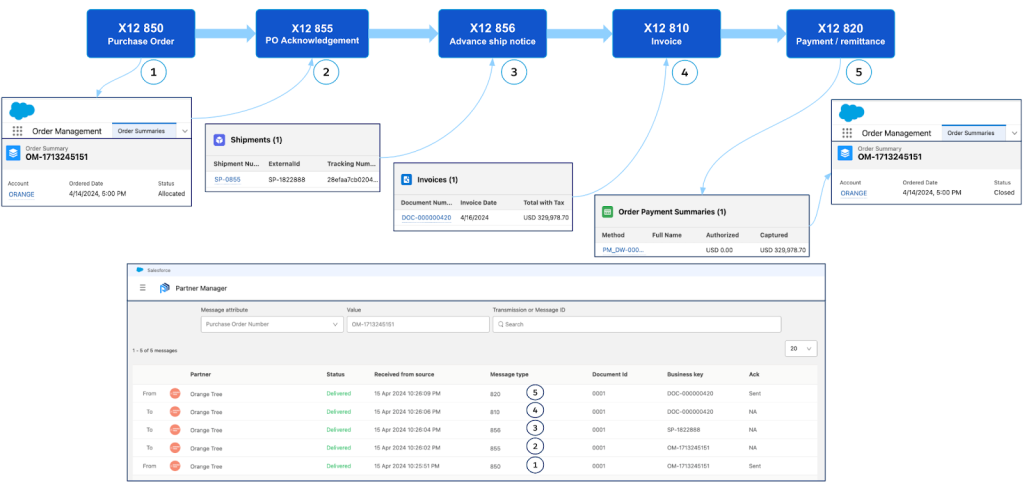Organizations across industry verticals such as manufacturing, consumer goods, high tech, and life sciences have adopted an omnichannel strategy to engage with their customers to receive orders. Newer digital channels such as B2B commerce sites and marketplaces witnessed exponential growth, enabling seamless buying experiences for customers.
Larger enterprises with vast supplier ecosystems prefer ordering via Electronic Data Interchange (EDI), taking advantage of the end to end automation benefits across the full order lifecycle. EDI continues to be the most dominant channel for receiving B2B orders, accounting for close to 75% of the total electronic sales and growing 15% year over year. As a result, B2B sellers engage with diverse buyer segments through different channels including B2B commerce sites, marketplaces, and EDI.
What is Salesforce Order Management (OMS)?
Within the enterprise, most organizations have a complex set of backend systems such as Enterprise Resource Planning (ERP) software, Warehouse Management Systems (WMS), and Transportation Management Systems (TMS) that play critical roles in the fulfillment, billing, and payments of B2B orders.
With orders received through various channels and multiple backend systems involved in the end to end execution of the order’s full lifecycle, organizations need a centralized order management system (OMS) and well-defined integration between internal systems, to offer a consistent and delightful experience to buyers regardless of the channel through which they order.
Salesforce Order Management (OMS) is a central hub for managing all aspects of the order lifecycle, including order capture, fulfillment, shipping, payment processing, and service. With Salesforce Order Management, merchants can receive orders from customers through any e-commerce channel and manage order fulfillment, shipping, payment capture, invoicing, and service by using integrated and customizable business processes and workflows.
Service agents can access a master repository of all order-related information, see a global view of the entire order lifecycle, and process cancellations, returns, exchanges, reshipments, refunds, and discounts. Salesforce Order Management is connected well with Salesforce’s B2B Commerce and B2C Commerce platforms, enabling efficient fulfillment and servicing of orders received via e-commerce sites.
MuleSoft Accelerator for Salesforce OMS: B2B, EDI support, and Salesforce OMS connectivity
We are excited to announce that we have launched a new MuleSoft Accelerator for Salesforce OMS with connectivity between MuleSoft’s Anypoint Partner Manager and Salesforce OMS. Anypoint Partner Manager is a low-code, next generation B2B integration platform. It enables the bidirectional exchange of business transactions such as purchase orders, shipment notices, invoices, payments and other supply chain/logistics messages via traditional EDI standards and modern API communications through standard B2B communication protocols.
B2B enterprises can ingest EDI orders from customers using the power of Anypoint Partner Manager, and can now directly automate moving order data into Salesforce OMS, and manage the bidirectional exchange of EDI transactions as orders get fulfilled.
This enables unified visibility of orders received via all digital channels. With EDI order information available directly within the Salesforce Customer 360 platform, B2B merchants can now offer a highly consistent and delightful experience for customers regardless of the channel used to place orders.

Real-time integration and end-to-end visibility
The solution design follows API-led connectivity approach, offering real-time integration and visibility of EDI transactions exchanged across the full order lifecycle execution. Anypoint Partner Manager’s configuration-driven experience enables quicker set up and onboarding of new customers to enable bidirectional EDI data exchange, executing the end-to-end order-to-cash workflow.
Process and system APIs packaged within the accelerator enables seamless connectivity to send incoming orders details to Salesforce OMS, and also listen for status changes within OMS to trigger outbound order acknowledgement, shipment notice and invoice transactions in real time. Lastly, when the buyer (customer) sends EDI payment remittance advice transactions, the information is sent back to Salesforce OMS, essentially closing the order.

As these chain of events occur throughout the fulfillment lifecycle, different user personas can get real-time visibility and insights of the orders both within Salesforce OMS, and in Anypoint Partner Manager. With added end-to-end traceability via Anypoint Monitoring, support team members can easily troubleshoot any issues within the workflow, ensuring the orders are processed and fulfilled in a timely manner..
What’s included in the Accelerator?
The MuleSoft Accelerator for Salesforce OMS (EDI with Anypoint Partner Manager) comes bundled with the following assets, enabling organizations to rapidly deploy and start processing EDI orders.
- Pre-built mappings for EDI X12 inbound Purchase Orders, outbound Purchase Order acknowledgements, Advance shipment notices, Invoices and inbound payment/remittance advice.
- Schemas and examples for EDI and Salesforce data formats
- Configuration utility to create B2B configurations in Anypoint Partner Manager via API calls
- Process and System API templates orchestrating end to end order lifecycle management with Salesforce OMS for ingesting orders and processing transaction lifecycle management as orders go through the fulfillment process.
- End-to-end sequence diagrams
Upcoming extensions to the MuleSoft Accelerator for Salesforce OMS
Over the coming months, MuleSoft plans to launch additional assets for EDI use cases with prebuilt mappings for EDIFACT standard and purchase order messages received as PDF or image files from customers, extracted with MuleSoft’s Intelligent Document Processing (IDP) offering.
In addition, MuleSoft will launch use cases to integrate Salesforce Order Management with Enterprise Resource Planning (ERP) software such as SAP and Oracle – enabling a fully end to end integrated experience across the entire order fulfillment lifecycle.
Efficiency reimagined
With MuleSoft Accelerator for Salesforce OMS, B2B merchants can utilize Anypoint Partner Manager to better leverage EDI as an efficient order in-take channel and offer a differentiated order fulfillment and service experience for customers. Anypoint Partner Manager provides seamless end-to-end transaction visibility across the entire order lifecycle, enabling superior operational management capabilities.
With upcoming innovations such as support for additional EDI standards and ERP integrations, customers can grow their business by rapidly expanding and scaling their B2B customer ecosystem.
Resources:
- Demo video: EDI Order lifecycle management with Salesforce OMS
- MuleSoft Accelerator for Salesforce Order Management (OMS): EDI Order lifecycle
- Anypoint Partner Manager Product Docs
- Salesforce Order Management Product Docs









